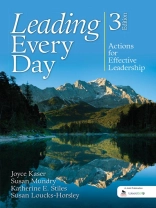Your shortcut to success for inspired school leadership!
Tap your greatest leadership potential and quickly get on track to meeting today’s complicated challenges with this follow up to the best-selling Learning Forward Book of the Year. Revised and updated stories, references, and quotes complement a completely new section focused on achieving results.
Effective leadership exists in us all. These short, inspiration-infused nuggets of actionable advice provide a path to get you there. New features include:
- A newly added Book 5 for help creating solid data systems and achievable results
- Over 150 convenient, closely integrated daily contemplations to carry anywhere
- Succinct, first-hand insights to proven leadership best practices that inspire, challenge, and instruct
- Up-to-date research on creative solutions to leadership challenges, change, and professional development
Build trust, spark innovation, and learn what it really takes to support a community of learners and leaders with this classic leadership resource!
‘This book continues to resonate, encourage, and motivate action. It′s a powerful combination of inspirational, critical, and practical guidance delivered in daily doses.’
—Stephanie Hirsh, Executive Director
Learning Forward
‘Every leader needs inspiration and sage advice. Leading Every Day is an almanac of practical information for leaders committed to raising the bar for themselves, their colleagues, and their shared success.’
—Karen Kearney, Leadership Initiatives
West Ed
Cuprins
Introduction
Book One: Leadership Every Day
Day 1: We Are All Leaders
Day 2: Effective Leadership Practices
Day 3: Making Conscious Choices
Day 4: Committing to a Moral Imperative
Day 5: Using Power Appropriately
Day 6: Building Shared Vision
Day 7: Promoting Diversity
Day 8: Leading For Results
Day 9: Using Habits to Our Advantage
Day 10: Generating and Sharing Knowledge
Day 11: Keeping a Client-Centered Focus
Day 12: Recognizing and Celebrating Success
Day 13: Networking
Day 14: Embracing Innovative Thinking
Day 15: Aligning Actions and Beliefs
Day 16: Examining Your Culture
Day 17: Building a Trusting Climate
Day 18: Collaborative Leadership
Day 19: Building Relationships
Day 20: Trying Something New
Day 21: Coping with Ambiguity, Change, and Confusion
Day 22: Leading Through Crisis
Day 23: Balancing Leadership and Management
Day 24: Living with Paradox
Day 25: Paying Attention to Leadership Actions and Traits
Day 26: Getting Support
Day 27: Asking Good Questions
Day 28: Finding Win/Win Solutions
Day 29: Modeling Leadership
Day 30: Ethical Leadership
Day 31: Doing the Right Thing
References
Book Two: Leading Change
Day 1: Change as a Process
Day 2: Change Happens in People First
Day 3: The Impact of Change
Day 4: Moving through the Stages of Change-Concerns
Day 5: Moving through the Stages of Change-Behavior
Day 6: Change as Continuous Improvement
Day 7: Speed of Change
Day 8: The Missing Piece in Change
Day 9: Balancing Constants and Change
Day 10: Recognizing Assumptions
Day 11: Crafting a Shared Vision
Day 12: Mission and Goals
Day 13: Motivating Others
Day 14: Planning for Change
Day 15: Origins of Change
Day 16: Accepting Loss
Day 17: Dealing with Disappointment
Day 18: Change and Resilience
Day 19: Facing Problems
Day 20: Neutralizing Resistance
Day 21: Capitalizing on Resistance
Day 22: Knowing Your Constituents
Day 23: Managing Multiple Change Efforts
Day 24: Systems Thinking
Day 25: Examining Change History
Day 26: The Downside of Change
Day 27: Building Ownership for Change
Day 28: Individuals as Agents of Change
Day 29: Self-Assessment as a Change Leader
Day 30: Sustaining Individual Leadership
Day 31: Initiating, Implementing, and Institutionalizing Change
References
Book Three: Leading Learning Communities
Day 1: Leading Communities of Learning
Day 2: Leading Learning in Organizations
Day 3: Building Cultural Proficiency
Day 4: Powerful Learning Experiences
Day 5: How People Learn
Day 6: Transformative Learning
Day 7: Transforming Situational Learning
Day 8: Defining Expertise
Day 9: Characteristics of Effective Professional Learning
Day 10: Aligning Beliefs and Behaviors
Day 11: Designing Professional Development
Day 12: Committing to Vision and Standards
Day 13: Using Data to Guide Professional Development Designs
Day 14: Inputs into Professional Development Design
Day 15: Knowledge and Beliefs in Science and Mathematics
Day 16: Professional Development in Context
Day 17: Critical Issues to Consider
Day 18: Ensuring Equity
Day 19: Strategies for Professional Learning
Day 20: Selecting and Combining Strategies
Day 21: Professional Development for Student Impact
Day 22: Balancing Philosophy and Pragmatism
Day 23: Incorporating Reflexive Practice
Day 24: Reaching Everyone or Scaling Up
Day 25: Team Learning
Day 26: Sharing Knowledge and Capturing Lessons Learned
Day 27: Using Program Logic Models
Day 28: Achieving Realistic Outcomes
Day 29: Gathering Evaluation Data
Day 30: Leading Learning by Example
Day 31: Taking Responsibility for Learning
References
Book Four: Leading Effective Groups
Day 1: Leading Groups
Day 2: Four Roles of Group Leaders
Day 3: Group Norms of Collaboration
Day 4: Group Norm #1—Pausing
Day 5: Group Norm #2—Paraphrasing
Day 6: Group Norm #3—Posing Questions
Day 7: Group Norm #4—Putting Ideas on the Table
Day 8: Group Norm #5—Providing Data
Day 9: Group Norm #6—Paying Attention to Self and Others, Verbal Communication
Day 10: Group Norm #6—Paying Attention to Self and Others, Nonverbal Communication
Day 11: Group Norm #7—Presuming Positive Intentions
Day 12: Dialogue Versus Discussion
Day 13: Dialogue as Reflective Learning Process
Day 14: Eliciting Participation From Everyone
Day 15: Cultural Proficiency
Day 16: Establishing Clear Roles and Functions
Day 17: Structuring an Effective Meeting
Day 18: Providing Logistical Supports
Day 19: Setting Up the Meeting Room
Day 20: Group Decision Making
Day 21: Reaching Consensus
Day 22: Giving Feedback
Day 23: Receiving Feedback
Day 24: Handling Problems
Day 25: Options for Resolving Conflict
Day 26: Conflict as Opportunity
Day 27: Facilitating Conflict
Day 28: Resolving Value Conflicts
Day 29: Dealing with Disruptive People
Day 30: Beginnings and Endings
Day 31: Six Domains of Group Development
References
Book Five: Leadership for Results
Day 1: Results-Based Leadership
Day 2: Role of Leader to Achieve Results
Day 3: Using Rigorous Evidence
Day 4: Being an Accountable Leader
Day 5: Role of Policy in Achieving Results
Day 6: Building a Culture of Continuous Improvement
Day 7: Equitable Access to Data
Day 8: Purposeful Use of Data
Day 9: The Power of Data
Day 10: Collaborative Inquiry
Day 11: Engaging Everyone with Data
Day 12: Data-Driven Dialogue
Day 13: Root Cause Analysis
Day 14: Cause and Effect
Day 15: Cause and Effect Analysis: The Fishbone
Day 16: Identifying Problems
Day 17: Communicating about Problems
Day 18: Criteria for Selecting Outcomes
Day 19: Selecting the Right Intervention
Day 20: Rapid Prototyping
Day 21: Assessing Evaluation
Day 22: Reflecting on Results
Day 23: Planning for Success
Day 24: Components of Trust
Day 25: Keeping the Trust
Day 26: Time Required for Results
Day 27: Getting Better Results
Day 28: Seeking Collective Impact
Day 29: Sustaining a Focus on Continuous Improvement
Day 30: Results Over Time
Day 31: Continuing to Learn
References
Index
Despre autor
Susan Loucks-Horsley was the lead author of the first edition of Designing Professional Development for Teachers of Science and Mathematics and directed the professional development research for the National Institute for Science Education on which the book is based. At the time of her passing in 2000, Susan was the associate executive director of Biological Sciences and Curriculum Study (BSCS) and senior research associate for science and mathematics at West Ed. She had previously served as director of professional development and outreach at the National Research Council’s Center for Science, Mathematics, and Engineering Education, where she promoted and monitored standards-based education, especially the National Science Education Standards. Susan was a leading researcher, writer, and professional developer who enjoyed collaborating with others to address education’s toughest problems. She was the lead author of several books, including Continuing to Learn: A Guidebook for Teacher Development, An Action Guide for School Improvement, and Elementary School Science for the 90s. In addition, she wrote numerous reports on teacher development for the National Center for Improving Science Education, as well as chapters and articles on related topics. While at the University of Texas/Austin Research and Development Center for Teacher Education, she worked on the development team of the Concerns-Based Adoption Model (CBAM), a classic framework for understanding and leading change efforts.












